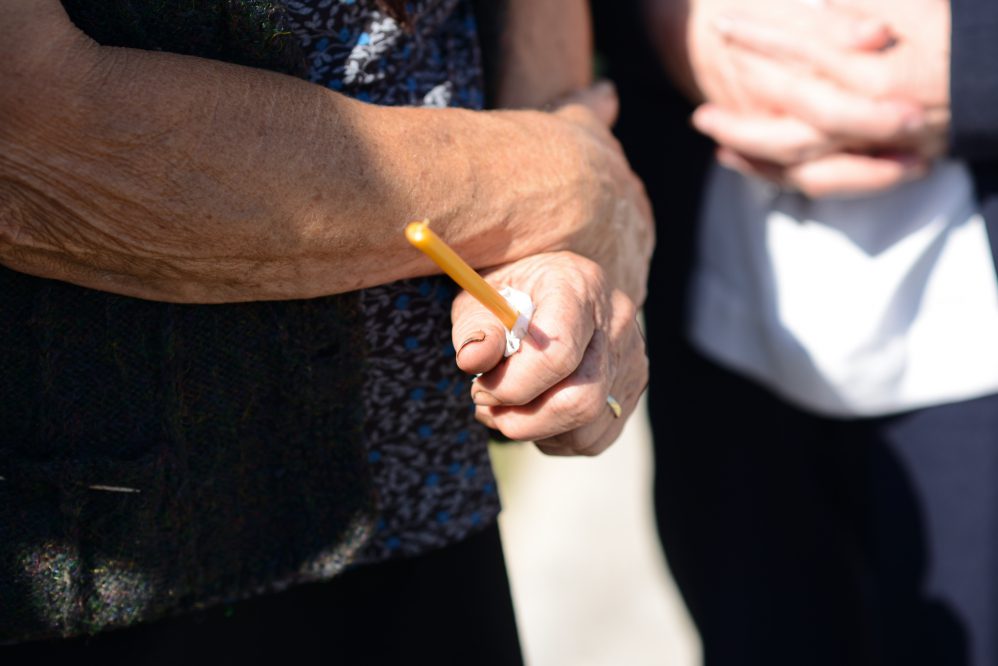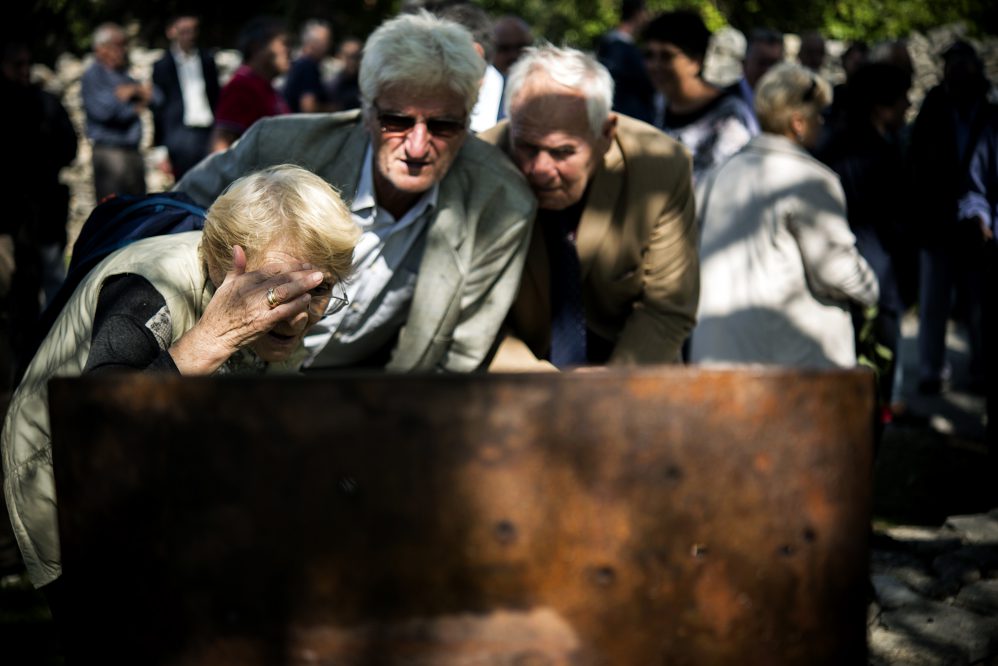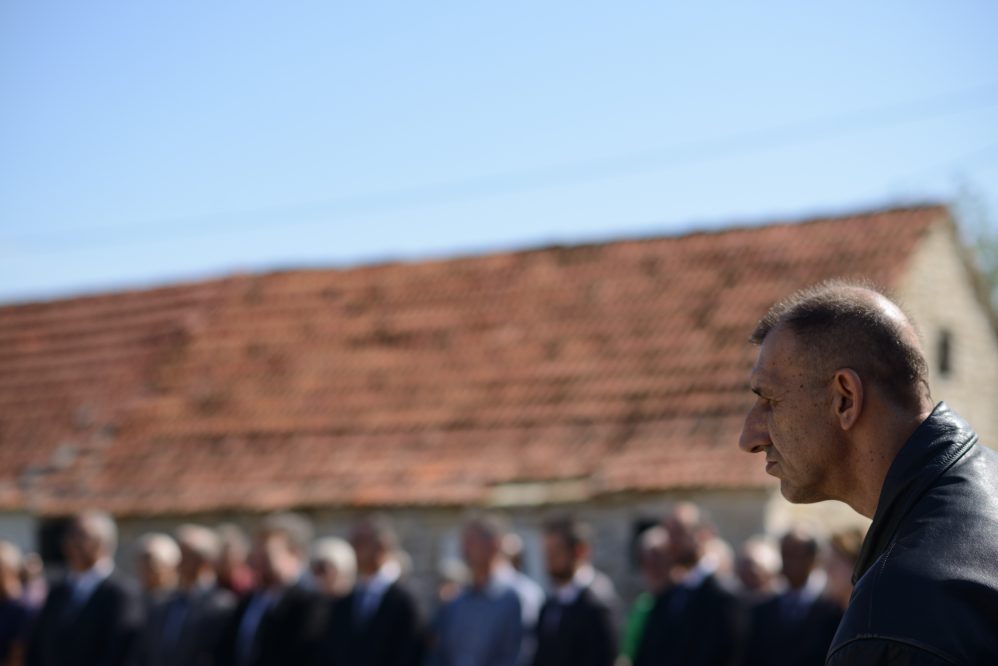Co-organised by the Serb National Council of Croatia (SNV) and the Municipality of Kistanje, commemorations were held on 28 September 2017 in the villages of Varivode and Gošić to honour sixteen Serb victims, elderly civilians killed in late September 1995 after the military and police action of the Croatian Army known as Operation “Storm”. The Centre for Nonviolent Action (CNA) was invited by SNV to attend the commemorations and together with war veterans from the Croatian Army (HV), the Army of Yugoslavia (VJ), the Army of the Republic of Bosnia and Herzegovina (ARBiH), the Croat Defence Council (HVO) and the Army of Republika Srpska (VRS), we attended the event. We were also joined by two peace activists from CNA and the Kruševac organisation Peace Builders. There were eighteen of us in all.
We arrived in Knin, some forty kilometres from the commemoration sites, on 27 September, a day early. We spent the night there and had an opportunity to see the deserted city with its historical royal fortress. The history of Knin is visible at every step, ranging from the medieval period to that fateful 1995. The street names and the fortress of King Zvonimir where we visited the Museum “Storm 95” remind us of this, while the period of the former Yugoslavia has been erased or simply left out. The return of this city to the Croatian state after five years when it was the capital of the Serb Krajina Republic, which at the time did all it could to remain without Croats, is taken very seriously here, as something sacred and final. A right won by military victory. Frozen in time and as such uninterested in what came after the “Storm”. What is important and visible is what came before and during this operation, from 1991 to 1995. The city lives like that, surviving from anniversary to anniversary, when victory is celebrated. In the meantime, it is forgotten. And there are fewer and fewer people in it. Even those resettled from Bosnia are slowly leaving, because there is no life there.
Varivode, twenty-two years after the crime. A commemoration for those that remained fifty days after Operation “Storm”. Nine elderly and unarmed Serb civilians who decided to stay, to trust that having done no wrong they would be allowed to remain in their homes. The memorial bears their names, written in both Cyrillic and Latin script, perhaps the only place where the two can still peacefully coexist. The wind beat the flags, of Croatia, Serbia and the EU, making them intertwine and perhaps hiding a metaphysical message about the connectedness of peoples. A man went to secure the flags so the wind does not tear them away, which is as much as a man can do in an effort to preserve. It is as much as any of us can do to help prevent being torn away by the winds of war again.
The gathering of some two hundred people was addressed by Milivoj Beader who read the essay “The Philosophy of Deprivation” from the collection Are We Monsters? by Filip David. It started with this difficult story about knowing the cause of the deprivation produced within and among the peoples of the region, the author having recognised it in the spiritual impoverishment that produces hatred. “Dullness and moral atrophy are proclaimed achievements in the civilisation of deprivation, while violence is presented as therapeutic because it releases an excess of power. This is what elevates bandits, arsonists and ordinary killers. The philosophy of deprivation produces reprobates in great quantities as it proclaims faith in nullity.” This was followed by an Orthodox Christian memorial service at the end of which, together with the victims’ families and political representatives, we laid a wreath. The host then announced that Adnan Hasanbegović would address the gathering on behalf of CNA. In his speech Adnan indicated the path we could take to try to overcome deprivation. He expressed his condolences to the families of the victims and on behalf of our group, he called on the authorities to ensure that those responsible for the crimes are prosecuted. “We have come to send a message of peace and to show that our generation, that participated actively in the war, in not made up of war criminals, but of honourable people who had the misfortune of finding themselves in the midst of a war. We want to warn new generations not to repeat our mistakes,” he said to those gathered and was greeted by applause. Compassion and solidarity win hearts.
Boris Milošević, an MP from the Independent Serb Democratic Party (SDSS), spoke about the period after the “Storm”, the looting and the killing of civilians who had stayed. He said that the key to opening dialogue between the nationalities and building good relations rests on the rule of law which must not leave war crimes unpunished.
We then set off for Gošić, driving through a barren landscape. The sunny Šibenik hinterland where you can still smell the sea air is struggling with the melancholy brought on by scenes of abandoned farmland.
In Gošić we gathered in the shade of a large chestnut tree surrounded by a low stone wall with wooden benches. Seven benches for the seven villagers, elderly civilians killed twenty days after the “Storm”. A large steel plaque installed vertically and already rust-bitten bears the names of the victims. It symbolises the bullet-ridden fence through which the Borak family was shot. The memorial was envisaged as a place of gathering, but not just for commemorations, as Aneta Lalić, director of SNV’s culture section, explained. It is a place for families and friends to gather and talk.
The programme started with another reading by Beader. This time he recited the poem “The Hour of Belated Knowledge” by Tin Ujević. After the religious service, we each laid a rose on the wall of the memorial. The gathering was then addressed by Anja Šimpraga, Deputy Prefect of the Šibenik-Knin County, who said that from this place, as we remember the innocent victims, she only asks that the guilty be punished for this war crime and extends her hand in reconciliation in the interest of living together in peace as we once did. Aneta Lalić addressed the gathering on behalf of SNV, particularly thanking the Mayor of Knin, Marko Jelić, and the war veterans for coming. “Violence against a person is also when the person is coerced into committing violence, and this is often forgotten in Croatia. So, thank you for speaking openly about this, not about what was won in the war, but about what was lost. That is why your coming here and the message you bring, especially from BiH, are so very important today,” Aneta said.
People started approaching us to ask whether we were these war veterans. These were not storybook characters, they were real, local villagers and members of the victims’ families. With tears in their eyes, but smiles on their faces, they thanked us, shook our hands and embraced us. They felt our support as they came to mourn their loved ones, which is why we were there. We also met the Mayor of Knin, whom we wanted to meet while we were in the city because of his statement to the media in recent months where he said he had no problem with paying his respects to Serb victims. He apologised for not being able to give our group more time due to prior engagements, but he assured us his door was always open. Speaking with the actor Beader, we found out he was also a former member of HV. He was glad to find another two former “defenders” in our group and said he hoped we would have more opportunities to meet.
Our visit to Varivode and Gošić sent a message that as veterans, we have a human need to pay our respects to victims, that we feel a responsibility to future generations to speak out about the destructiveness of war and its human toll.
The HV war veteran from our group concluded that it was important, culturally more than politically, that we were here in Croatia, because it went towards changing the culture of memory, which can then be constructed in a different direction.
Amer Delić


